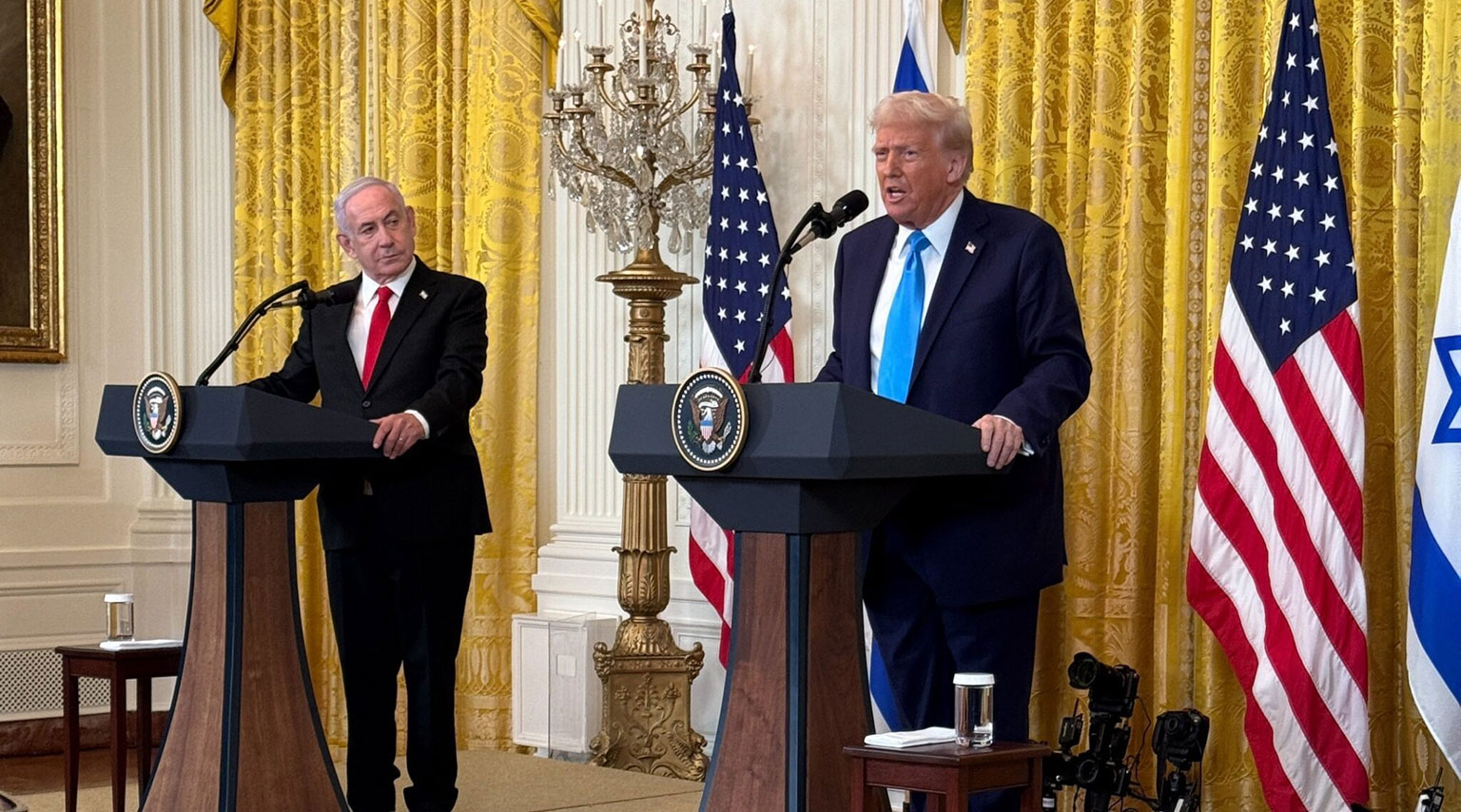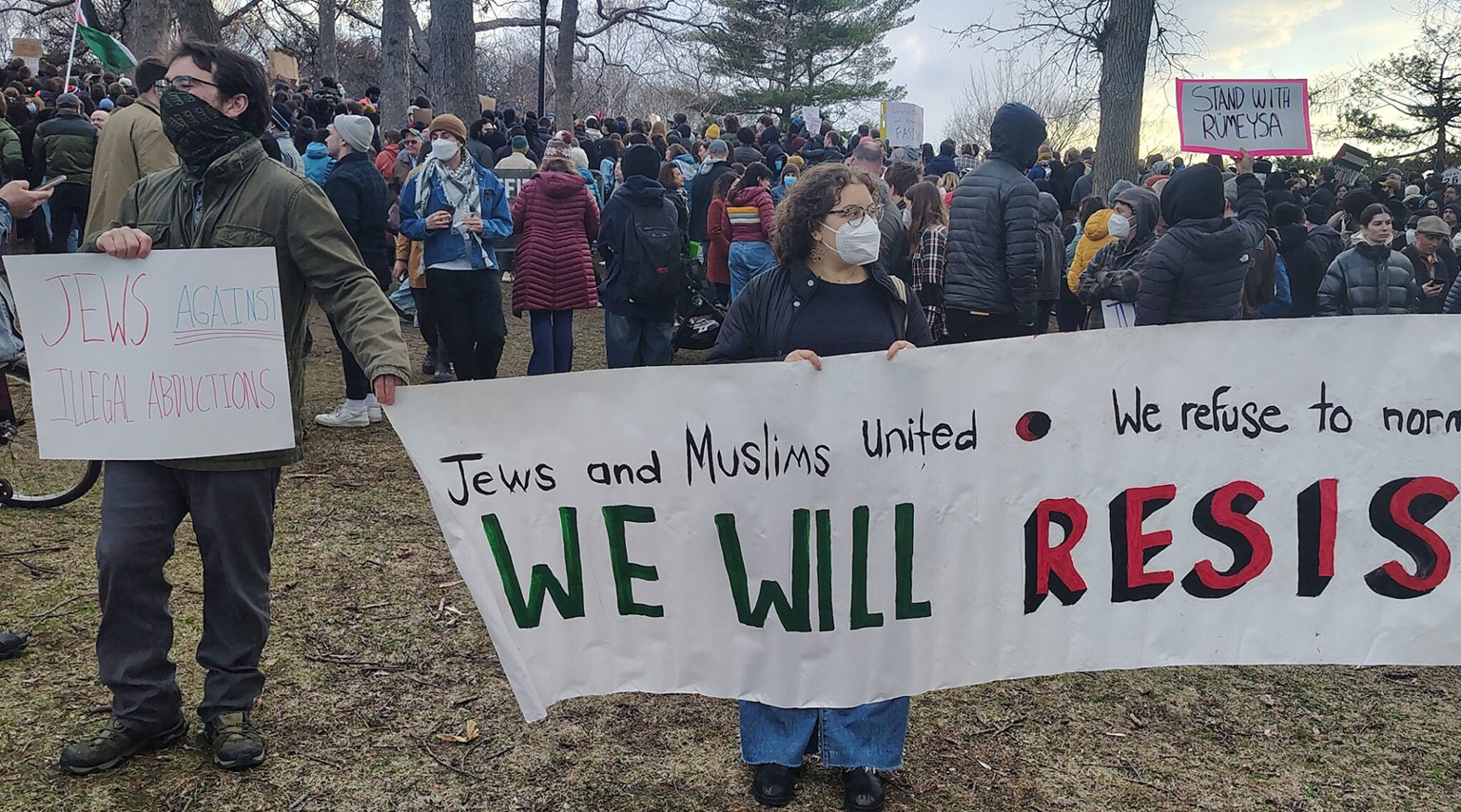
Courtesy of JTA. Photo credit: Michael Loccisano/Getty Images
Students are led to their classroom by a teacher at Yung Wing School P.S. 124 in New York City, Mar. 7, 2022
(JTA) — New York Jewish Week – New York City educators and parents are protesting after the city announced that public schools would be open for part of Passover next year, breaking from a longstanding tradition.
The eight-day holiday has overlapped virtually every year with the city’s spring break since 1973, when Jewish teachers successfully lobbied to guarantee the alignment.
But next year, Easter and Passover are separated by three weeks, making it impossible for the city’s weeklong school recess to overlap with both of them. The school-year calendar released last Friday revealed that the NYC Department of Education had scheduled the final two days of the holiday, April 29 and 30, as school days.
Because those days are Jewish holidays, when certain activities are prohibited according to Jewish law, observant educators and students would not be able to attend. The departure from tradition has put those people in a difficult situation, in part because educators have limited flexibility to take days off under their union contract.
“I’m religious and I am required by my religion to take those days off, regardless of whether we have school or not,” Yocheved Diskind, an occupational therapist at a public school in West Harlem, told the New York Jewish Week. “So now I have to take two extra days off and I don’t get paid at all for them.”
Diskind is one of around 3,000 people to have signed a petition calling on the city to extend the spring recess to include the Passover holidays.
“At a time when the values of inclusion are under attack, respecting the full observance of the Passover holiday should not be dependent on its proximity to Easter on the calendar,” says the petition, whose first signatories are from the occupational and physical therapists’ chapter of the United Federation of Teachers.
The pushback comes at a moment when the structure of the school year is being contested on several fronts. In a bid for inclusion, the education department has recently added holidays from multiple traditions to the school calendar — including the Muslim holidays of Eid al-Fitr and Eid al-Adha; the Chinese Lunar New Year; Juneteenth and, potentially in the future, the Hindu festival of Diwali. Depending on how each holiday falls, the new days off can put pressure on the city to meet a 180-day minimum set by state law.
At the same time, the city education department and its teachers union negotiate annually over when teachers must work, and the city’s goal is to maximize the time that teachers are required to be in the classroom. Next year’s school calendar includes 185 required workdays for educators, including 182 instructional days, leaving some in the union concerned that members are being exploited.
“They used to build in an extra two or three days: In case they had to cancel for snow days, they would still reach 180 days. But since the pandemic, snow days are all remote days,” Diskind said. “So there’s no reason to build in even an extra two days into the calendar without extra compensation.”
The city, meanwhile, says it negotiated the new calendar with the union and that the holidays that are required contractually to be days off are. About the end of Passover, Nathaniel Steyer, the DOE press secretary, told the New York Jewish Week that the union “never ever brought this up” in negotiations about the calendar.
The UFT did not respond to repeated requests for comment by press time.
“There is no precedent for giving all days of Passover with a split,” Styer said in a statement. “There has been a split three times in recent memory — with the last night falling on the weekend. It is in our labor agreements that only the first two days of Passover and Good Friday are covered. Spring Recess is not in our labor contracts, but we generally attempt to cover most of Passover & Easter, when they are aligned on the calendar.”
New York City is among the rare school districts where Jewish holidays have been baked into the school-year calendar. For decades, the city had so many Jewish teachers and students that having classes on major Jewish holidays was a fool’s errand. The 1973 agreement around Passover came as the number of Jewish students and teachers was dwindling.
Now, the district has relatively few observant Jewish students; Orthodox schoolchildren in the city almost all attend private schools. But there are significant numbers of Orthodox education department employees, including in support services such as speech and occupational therapy. (The petition notes that students who attend school on Passover might have to do so without the support of these providers.) And the expectation not to have school on major Jewish holidays has largely survived, at times resulting in quirky calendars, such as a five-day gap between the first and second days of school in 2010.
The school calendar departed from the 1973 Passover agreement only once, in 1986, according to the petition. That year, Passover and Easter were not close in time, and adding two additional days off would have taken the district below the state requirement. Teachers then were given blanket approval to take the days as personal days, the petition says.
Diskind, the occupational therapist in West Harlem, explained that teachers could take the two days of Passover as personal days next year but would be left with only one discretionary day for the rest of the school year. They could also take time off without pay, an option that some Jewish educators exercise when other Jewish holidays fall on school days, but doing so has financial repercussions. (During the next school year, the fall Jewish holidays all land on weekends except for Yom Kippur, when schools are closed. Shavuot, the two-day spring festival, falls midweek in June.)
“Most people choose to take an unpaid day off because you generally need to use personal days for other reasons that would not be excused throughout the year,” Diskind said. “In the long term, unpaid days also require you to stay longer in order to reach your pension.”
Districts around the country have contended with how to accommodate religious observances — and not everyone believes the solution is ever to close schools at all.
David Bloomfield, an education professor who was a parent leader in New York City when his own children attended its public schools, told the Jewish Telegraphic Agency in 2020 that he thought districts should ramp up their protections for students and teachers who miss school for religious reasons instead of trying to adjust the calendar to please everyone.
“With the growth and sensitivity toward diversity, it’s one thing for a hermetic community to observe its traditions,” Bloomfield said. “But as we become more diverse, we have a harder time accommodating all of those important ceremonial obligations.”
“New York City is home to a diverse population, including 1.6 million Jews. People who celebrate Passover are a part of the rich fabric of our city,” says the petition. “The Passover holiday should not be an arena for givebacks and increased instructional days without compensation.”
“The proposed DOE calendar is especially disturbing in light of the increase in anti-Semitic rhetoric and attacks in recent years, particularly in New York City,” it also noted.
The number of anti-Jewish hate crimes in the first five months of the year was 100, according to data released this week by the New York Police Department, showing a 25% decline from 135 during the same period last year. Jews accounted for the victims of half of all hate crimes in the city last year and remain the most-targeted group, according to the police data; two men recently pleaded guilty to hate crimes related to a high-profile 2021 attack on a Jewish man who was beaten while walking to a pro-Israel rally.




